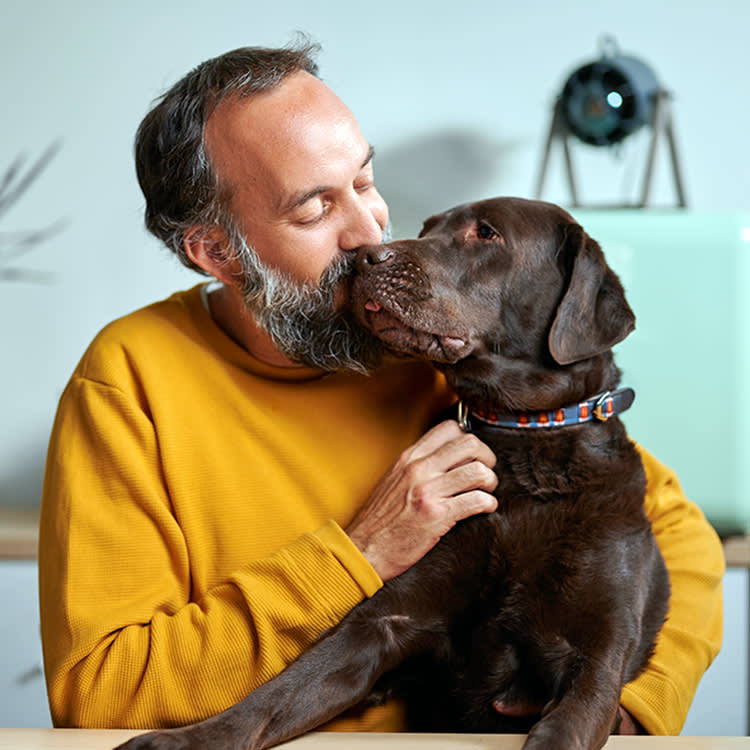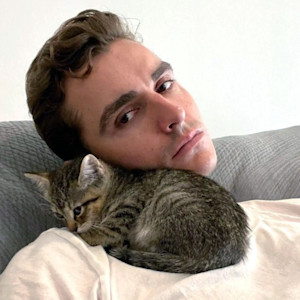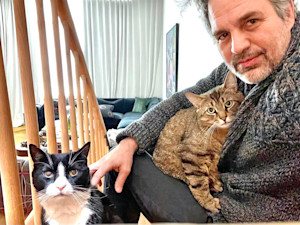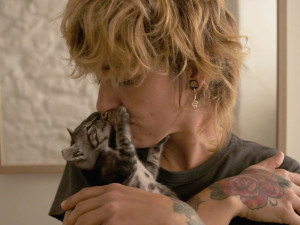Why the ‘Reluctant Dog Dad’ Who Never Wanted a Pet Always Ends Up Obsessed
We see the phenomenon with cats, too.

Share Article
Many years ago, cat behaviorist Linda Hall married a man who did not like cats. Though she was an avid fan of felines, the two had met after Hall’s beloved cat had passed away, and she was not yet ready to adopt again. When she decided it was time to have a new kitty in her life again, her husband was not thrilled. “OK, just one cat,” Hall recalls him saying. She lobbied for two — arguing they do better in pairs — and his days as a “dog person” were quickly over.
“I don’t think they were in the house a full day before I found him on the floor playing with them,” she says of her (now ex) husband. “He grew to love cats — even when we got up to having 13 at one time.”
Hall adds that when their marriage ended, her husband kept one of the cats with whom he was especially bonded. “I am convinced that people who say they hate cats, are people who have never truly known a cat!” she says.�
And it’s not just cat dads who go from resistant to completely smitten. When Kinship Senior Editor Hilary Weaver’s family first brought home their puppy, Cinnamon, when she was a kid, her dad insisted he was a “cat person“ who could never be swayed to love a dog. That attitude lasted all of one day.

“The second Cinnamon stalked him down the hallway and pounced on him like a cat, he was totally gone,” she says. “It was as if she knew exactly what she needed to do to gain his love. She instantly became his favorite thing about life, and when she died six years ago, he was a wreck. He still can’t talk about her without welling up.”
Hall and Weaver are not alone — a common trend on TikTok includes phrases like “my dad and the [cat or dog] he swears he didn’t want” followed by videos of endless cuddles and play between the previously hesitant caregiver and his new pet.
So, what is it about these men and their pets? Let’s get into it.
Cats love non-cat people, aka hard-to-win-over dads.
First, let’s start with the reluctant cat dad. You know, the one who’s probably sitting in his favorite lounge chair right now, his hand mindlessly scratching their ears while their endless purr box booms their satisfaction.
This internet trend doesn’t come out of thin air, says Jessica Austin, a PhD candidate at University of Colorado Boulder, who has researched men’s relationships to cats.
First of all, she has seen it in pet parents like Hall’s husband who think they prefer one kind of animal over another but have simply not spent a lot of time with them. Just like a cat person may be unsure about learning the ways of a dog, former “dog people, for example,” may not know how to interact with cats at first, Austin says. But ironically, cats will often end up liking the most stand-offish person in the home the most. They generally prefer to take time to scope out new people before interacting with them, and those who are super into cats don’t usually give them that space.
“People who don’t have experience with cats don’t understand that by ignoring them, they’re actually enticing the cat more,” Austin says. “When the least enthusiastic person in the house doesn’t get up in the cat’s space, this lets the cat know that the person is respecting their boundaries, and thus they feel more comfortable approaching that person.”
Cats’ wariness of new people is due in part to their acute senses;opens in new tab they can be sensitive to energy, scents, and body language. That means unfamiliar stimuli or strong odors from new people can quickly trigger avoidance or defensive reactions. Many of the men Austin interviewed in her research told her that it felt especially rewarding to win over the love of a previously ambivalent cat.
“[Many subjects] said they feel a different kind of connection to cats they have bonded with, because dogs have given them affection and trust right away, while they’ve had to earn cats’ affection,” she says. “It’s kind of like they’ve passed a test to get into an elite club, because cats are more cautious and discerning. You feel a sense of achievement if a cat likes you — especially if they’re shy or hesitant at first.”
Dogs are often not shy about their love—which can make even the grumpiest person smile.
Of course, we all know plenty of cats are super affectionate and forthcoming about their love. But, on the whole, you don’t have to hold your breath for a dog to tell you they want to be your best friend (licks, cuddles, bringing you their favorite household item when you come over for a visit). In other words, they are not subtle.
Animal behaviorist and trainer Karen London says, “It’s a common pattern; a man goes from reluctant (at best!) about adopting a dog to over-the-moon in love with them.” She adds that “it sure sticks in my memory when it’s a much older gent from a generation where men did not feel as free to express their gentle loving side as younger men are, or they are a stoic sort of guy naturally.”
She remembers one particular client, an elderly man who came to his training session with his dog and his son. His son had encouraged the man to get the dog after his wife of 58 years had died. The son lovingly shared with London that his father was more affectionate with the pup than he’d ever observed in the past. London remembers the exchange: “‘He tells this dog he loves her more than he ever told my sister and me!’ and the elderly man answered, ‘She needs to hear it every day, and who else is there to tell her?’”
Older men are particularly fond of their pets for a reason.
When it comes to cats, Austin says this reluctant-pet-dad trend highlights distinctive cat behaviors and underscores broader shifts in gender and caretaking norms.
Austin notes that many of the viral social media videos about the “dad who never wanted a cat” include older men, and that is no coincidence. Norms around caretaking — both of human children and pets – have evolved in recent years, but older men may still express that same conditioning.
“If you look at the trope of the reluctant dad, it’s generally a man from Gen X or earlier,” she says. “These are men who, broadly speaking, were expected to be less involved in caregiving, whether for a child or a companion animal. For these men, the family pet might feel like a safer outlet for taking on a caretaker role or showing affection, because human-animal dynamics are much less complicated.”
London says that she doesn’t necessarily observe this behavior in one particular generation of dog dads, but she thinks there is something to be said for what Austin has observed. “I do think many men become a softer, gentler version of themselves as they age, though, and we see that in the way they interact with their pets.”
Even with ideas around gender and caregiving shifting, many Americans believe women are naturally better at caring for children, and caregiving still often defaults to women, according to a 2017 surveyopens in new tab from Pew Research Center. These stereotypes can extend to pet caregiving, especially when factoring in the trope of “crazy cat ladies” as it relates to male pet parents. Austin notes one of the subjects she interviewed for her study said he felt he had to hide his love of cats to maintain the image of the “tough, overtly masculine football player.”
Austin adds that the internet is helpful for shifting this stereotype of men who are pet parents. And part of this shift, she says, is that these men are talking about their pets with full-throated affection and pride, much like dads these days who speak about their human children.
London summarizes it perfectly: “Whenever love is honest and pure, it’s a beautiful thing, and I wish we saw that from men, and everyone else, too, more often than just with pets. But I do love how dogs and cats bring this out in people in ways that surprise us. Of course, it will be even more beautiful when such loving ways are not surprising from men, but we're still collectively a work in progress in that way.”

Kari Paul
Kari Paul is a Paris-based writer, artist, and filmmaker whose work has been published in The Guardian, The Wall Street Journal, New York Magazine, ELLE, and VICE. She has had an endless march of more than 20 foster kittens, cats, and dogs over the last few years and always cries when they leave. She covers technology, personal finance, and animal behavior, among other topics.
Related articles
![Dave Franco with his kitten at home.]()
What Makes Cat Dads So Sexy? A Look at Dave Franco and More Hot Guys With Cats
Meow, daddy.
![Mark Ruffalo and two cats at home.]()
The World’s ‘Sexiest Cat Dad’ Contest is Underway—Cast Your Vote Now
It’s a tough call but someone has to do it.
![A man sitting at his kitchen table using a laptop with a black and white cat on his lap.]()
Are Men Discovering Their Softer Side? New Report Finds More Males Are Adopting Cats
Man has a new best friend.
![Blonde woman with hand tattoo kissing her gray kitten]()
A Step-by-Step Guide to Adopting a Cat
From where to begin looking to what the adoption process entails to how to prepare your home for your new pet.



